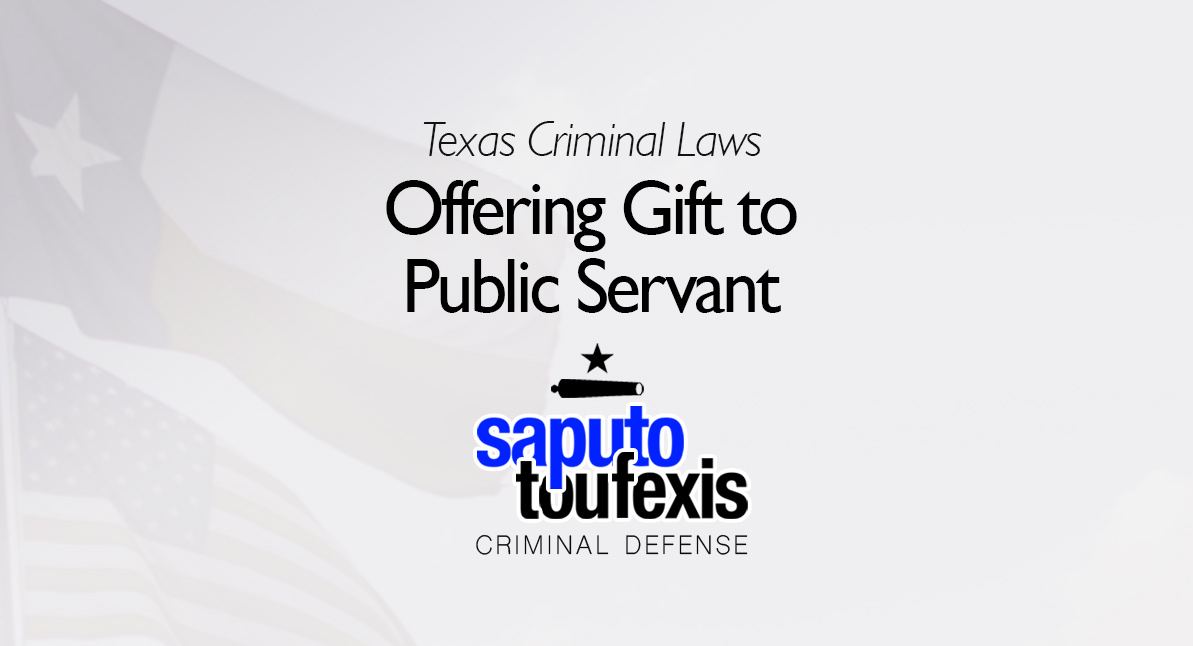The Texas Offering Gift to Public Servant law gives police the right to arrest you if they believe you offered a benefit or gift to a public servant knowing the public servant can’t legally accept it.
FAQs about the
Offering Gift to Public Servant law in Texas
- What is the current Texas law about Offering Gift to Public Servant?
- What is the penalty for a Texas Offering Gift to Public Servant offense?
- How can I be charged with an Offering Gift to Public Servant offense in Texas?
- What is the statute of limitations for Offering Gift to Public Servant in Texas?
- Can you get probation for Offering Gift to Public Servant in Texas?
- What level of crime is Offering Gift to Public Servant in Texas?
This is the companion offense to Gift to Public Servant by Person Subject to His Jurisdiction. Under that law, certain public servants are prohibited from accepting gifts from certain other people – people under their “jurisdiction.”
Have you been charged with Offering Gift to Public Servant? Contact us today to discuss legal representation.
or Text or Call (888) 239-9305
The Texas legislature codified this criminal offense in Texas Penal Code Section 36.09. The legislature did not update this law in 2025. In fact, this law has not been amended since 1993.
The Penal Code classifies the Texas Offering Gift to Public Servant law under Title 8 “Offenses Against Public Administration,” Chapter 36 “Bribery And Corrupt Influence.” Learn more about the Texas offense of Offering Gift to Public Servant below.
What is the current Texas law about Offering Gift to Public Servant?
AV Preeminent Texas lawyer Paul Saputo provides the current law defining Offering Gift to Public Servant in Penal Code Section §36.09, as follows:[1]
(a) A person commits an offense if he offers, confers, or agrees to confer any benefit on a public servant that he knows the public servant is prohibited by law from accepting.
Public servant is not specifically defined in this statute, nor is there a definition that applies to the entire chapter. However, there is a definition found in Penal Code 1.07 that 1.07(a) states applies throughout the Penal Code. Also, in the Penal Code section prior to this one, the companion offense of Gift to Public Servant by Person Subject to His Jurisdiction specifies which public servants are prohibited from accepting gifts from which other people – people under their “jurisdiction.” Accordingly, at least those public servants are prohbited from accepting gifts in the manner prescribed therein.
What is the penalty for a Texas Offering Gift to Public Servant offense?
A conviction for Offering Gift to Public Servant in Texas is punished as a Class A misdemeanor,[2] with a maximum possible fine under Texas state law of up to $4,000 and jail time of up to one year.
How can I be charged with an Offering Gift to Public Servant offense in Texas?
You can be charged with Offering Gift to Public Servant in Texas if the state’s attorneys believe that each of the elements of §36.09(a) as described in the section above have been met. Importantly, the state’s attorneys have to believe that you knew the gift or benefit was prohibited under the law.
What is the statute of limitations for Offering Gift to Public Servant in Texas?
As a misdemeanor, Offering Gift to Public Servant charges have a two-year limitations period.[3]
Can you get probation for Offering Gift to Public Servant in Texas?
The Texas Code of Criminal Procedure allows both judges and juries to grant probation for Offering Gift to Public Servant, and judges are also allowed to accept deferred adjudication plea deals.[4]
What level of crime is Offering Gift to Public Servant in Texas?
The Penal Code classifies Offering Gift to Public Servant as a Class A misdemeanor.
Learn more about the penalty range for this offense in the section above.
Legal References:
^1. Texas Penal Code §36.09. This law is current as of 2025.^2. Texas Penal Code §36.09(b)^3. See Code of Criminal Procedure 12.02(a)^4. See Chapter 42A, Texas Code of Criminal Procedure, Art. 42A.054, Art. 42A.056, Art. 42A.102










